ALLY feature in today’s Seattle Times
January 25, 2013Fri, Jan 25, 2013

Cross-cultural ties examined in documentary
By Sarah Stuteville
Special to The Seattle Times
“The bibimbap, is that dolsot?” asks documentary filmmaker Eli Kimaro looking up from the menu of Wabi-Sabi in Columbia City.
She’s trying to gauge the authenticity of the Korean dish in question. This version doesn’t come in the traditional heated stone pot (dolsot), but she goes for it anyway — calling the rice bowl a favorite “comfort food.”
Kimaro couldn’t be more at home ordering Korean food in a neighborhood with an African-American history and a growing reputation for international diversity.
Her father is Tanzanian and her mother is Korean. They both worked in international aid and development in Washington, D.C., and Kimaro grew up in a community where being cross-cultural “was the norm.”
But that norm was challenged when Kimaro left home for college. She says she sought to join a Korean Student Union and was met with skepticism from members who saw her first as a black woman, an experience that would be repeated as she was forced to grapple with other people’s assumptions about her background.
Outside of the international community Kimaro grew up in, multiracial families were uncommon in the 1970s. Her film “A Lot Like You” mentions that Kimaro’s parents were married only a few years after anti-miscegenation laws were overturned by the Supreme Court.
By comparison 9 percent of all marriages in the United States were interracial or interethnic in 2009 — double the number in 1980.
Kimaro, who identifies as a black woman and a “Tanzkomerican” explores these themes in “A Lot Like You,” which follows her journey back to Tanzania to explore her family’s roots in the Chagga culture while telling the story of her unique childhood.
But the movie, like Kimaro’s background, is complicated. What was intended to be a way of recording the traditions of the Chagga people also became a story of pervasive gender violence within the community. The film ultimately explores Kimaro’s own experience of sexual violence.
Kimaro is proud that the film can’t be “pigeonholed” as singularly about gender violence, mixed-race identities or multicultural families. And while it may not be what she set out to make, “A Lot Like You” is resonating with audiences.
The film has won awards at festivals that showcase Asian, black and female-directed films. Locally, it won an “Audience Choice Award” at The Seattle International Film Festival and is opening for the newly resurrected Seattle Asian American Film Festival tonight (the screening is already sold out).
It’s not lost on Kimaro — who has an Obama poster in her bathroom — that she’s part of a zeitgeist.
“There’s an understanding that you can have a family that spans the U.S. and Asia and Africa or many different continents and have a family- gathering picture where you just look like a photo of the United Nations.”
Vanessa Au, a co-director of the Seattle Asian American Film Festival, agrees that their audiences are hungry for a new kind of film.
“Our movies differ from ’90s-era Asian-America film, where we were really stuck on generation gaps and model minority stuff … [Kimaro] talks about being mixed race and that’s a theme that’s starting to emerge more in film.”
Kimaro says she’s found an updated version of the international sensibilities she grew up with in D.C. in Seattle, specifically her neighborhood (she swears she’ll live anywhere … as long as it’s in the famously diverse 98118 ZIP code). And she’s thrilled to be opening at an Asian American Film Festival here in Seattle.
“Just the thought that a movie that takes place almost entirely on Mount Kilimanjaro could help edify our conversation about what the Asian-American experience is … that to me is amazing.”
I watched “A Lot Like You” for the first time the day after President Obama’s second inauguration, following an election that brought a nationwide recognition of the shifting demographics of our country.
The audience included two friends who are in, interracial relationships. As the credits rolled, one turned to me and said, “I liked it a lot but it’s hard to say why; it was kind of all over the place, right?”
To which I responded, “Yup, and I think that was exactly the point.”
Sarah Stuteville is a multimedia journalist and co-founder of The Seattle Globalist, www.seattleglobalist.com, a blog covering Seattle’s international connections. Sarah Stuteville: sarah@seattleglobalist.com. Twitter: @SeaStute
